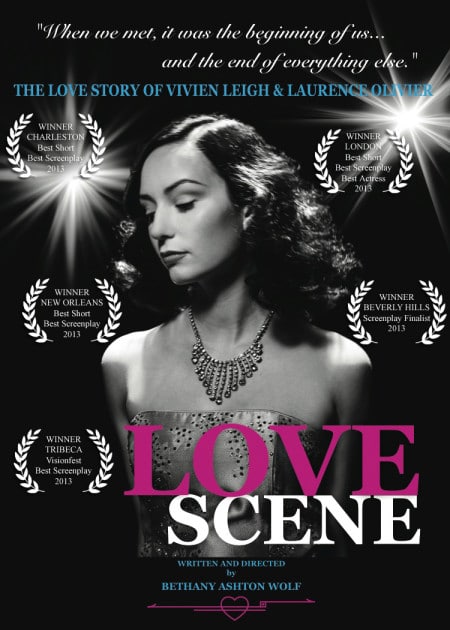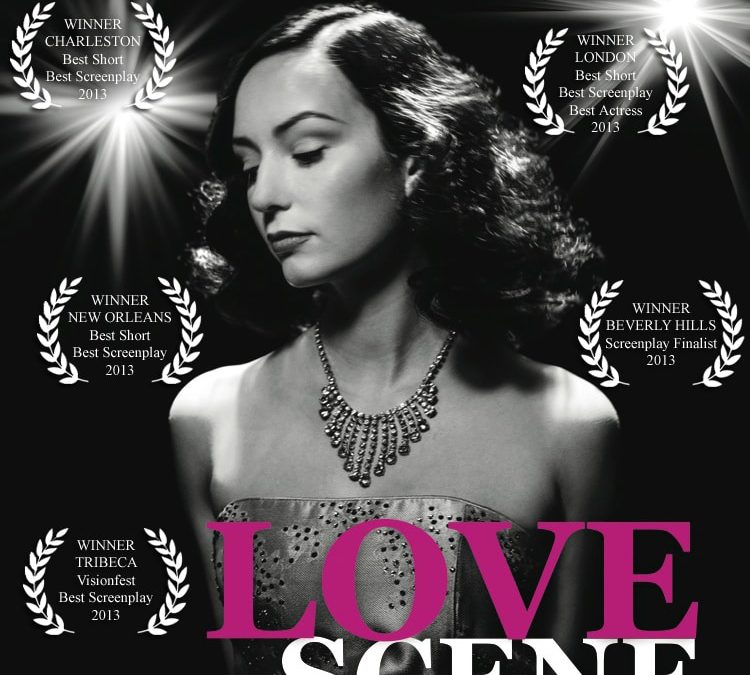
Our thanks to Master Cat! Geoff Harris for this breakdown of the intoxicating 8-minute film that’s piling up well-deserved awards, including Best Short, Best Screenplay, and Best Actress from the 2013 London International Film Festival. And be sure to note the link and password that will allow you to screen the film at the bottom of this blog!
I had to see the short film, Love Scene, for myself. In it, my daughter Caitlin portrays movie star Vivien Leigh. And to look like the actress — best known for her role as Scarlett O’Hara in Gone with the Wind — she had to wear green contact lenses, dye her hair black, and speak in a slight British accent.
When I saw the film, I was blown away. (And this isn’t just a proud papa talking.) Caitlin had been transformed into Vivien Leigh, who was taking her screen test in 1935 London. But what surprised me as much as the acting and the look of the film was the writing. It was stellar — playful, tragic, and alluring. Love Scene was a mini-movie in eight minutes. In what was essentially one scene — only seven-and-a-half pages long — there was a three-act structure, with a clear beginning, middle, and end. It was if writer/director Bethany Ashton Wolf had channeled Blake Snyder and his 15 Story Beats while writing her short film.
On this website, a couple of years ago, I blogged about using the STC! Story Beats — originally conceived for feature film writing — to structure a TV pilot. And, in another blog on this site, I wrote about how a fiction writer could employ those same beats when writing a novel. This got me to thinking: perhaps the Story Beats could also work in a short film.
I watched the short film again and again (hey, it’s only a little more than eight minutes long!) and even read its script several times (hey, it’s only seven-and-a-half pages long!), and my supposition was correct: Love Scene hits STC! Story Beats. From this one example, we could extrapolate that the Beats could be applied to short films in general in order to make their stories resonate.
Wolf made the film to raise interest and backing for the full-length screenplay she wrote that chronicles the 25-year love affair of Vivien Leigh and Laurence Olivier and is based on the book Vivien: The Life of Vivien Leigh by Alexander Walker.
(Note: Before I break down the short into its Story Beats, it should be mentioned that there was no B Story in this short film [Editor: Some commentators have discovered a B Story; see the Comments below], and the Fun and Games beat occurred much earlier than usual.)
Title: Love Scene
Writer/Director: Bethany Ashton Wolf
Logline: In 1935, a relatively unknown actress takes her first screen test in front of a renowned British film director, only to reveal her need for true love with a famous actor who, tragically, is already married.
Genre: Buddy Love
Sub-Genre: Epic Love, Forbidden Love
Opening Image: Through a Camera Lens, a blonde actress twirling for the camera at a screen test comes into focus. A similar image – blurred that comes into focus – is repeated when main character Vivien Leigh is introduced, signifying the blurred line between art and real life.
Set-Up: Vivien states her situation at home: she’s married to a barrister and, together, they have a daughter who just turned three years old.
Theme Stated: Vivien remarks what she needs: true love with the man she’s supposed to be with… famous actor Laurence Olivier.
Catalyst: Director Basil Dean points out that Olivier and Vivien are married to other people.
Debate: Vivien argues that Olivier and she are meant to be together, that it’s (to use an STC! term) a “journey” she should go on.
Break into Two: Vivien’s goal is to be with Olivier.
Fun and Games: Vivien moves out of her Act One world by calling out Basil for drinking during her screen test and she asks for a dry martini.
Midpoint: Vivien argues that she and Olivier should be together because their love is similar to the love of such Shakespeare characters as Hamlet and Ophelia, Romeo and Juliet, and Antony and Cleopatra.
Bad Guys Close In: Basil points out that Vivien has compared her love for Olivier with Shakespeare’s tragedies.
All Is Lost: Basil’s remark has cut Vivien to the quick. She stands in silence for a brief moment.
Dark Night of the Soul: Vivien agrees with Basil that she and Oliver are “…star-crossed lovers ‘til the end of time.” Tears roll down her cheeks.
Break into Three: Basil wonders if Vivien is acting right now or telling the truth.
Finale: Vivien asks Basil which answer will get her the part.
Final Image (not counting the tag under the closing credits): A close-up of Vivien through the Camera Lens – clearly in focus.
You can watch the short film by selecting this link and using the password: elephantwalk.
BJ Markel
15 Comments
Leave a Reply Cancel reply
You must be logged in to post a comment.










Hey Geoff. Congratulations to you and your daughter. It hits the beats for sure. It still amazes me how a good story hits the beats no matter what the length, from the 30 second Pledge spot Blake talks about in Strikes Back to other shorts I have examined myself and posted in previous blogs here at STC (The Sorcerer’s Apprentice, Vincent, Frankenweenie, Paperman). Lesson: skip or depart from the beats with the greatest caution! Your daughter was wonderful as was the writing and direction. Bravos and bravas all around.
Tom
LOVED the 8-minute film!! Your daughter is super talented (and gorgeous, to boot). I would run to see this as a full-length movie and hope it comes out soon!
I’m no expert, but I wondered–if you look strictly at this short film–if the B story could be the relationship of Vivien to her “handler,” the director. While he’s cajoling forth moments of transcendent beauty, or art, from Vivien, she’s doing the same with him, challenging him to name his directorial vision. The irony is that their dynamic feeds off of references to their flawed humanity, their feet of clay–both wedded to obligation and the lure of escape–and the presence of a hard outer reality neither seems able at this point to dismiss.
If the theme has to do with star-crossed lovers, then in Vivien’s relationship with the director she’s learning that tragedy, like Scotch or a good dry martini, is best brought out of the shadows and shared with an empathetic friend.
Don’t mind me…I’m merely riffing here. But it’s so much fun!!!
Again, congratulations to your daughter and everyone involved–this is going to make a great full-length film.
TGIF, everyone!!!
Kieran :-)
BRAVO to your daughter! The director part was also well acted.
Kieran – awesome riff!
Geoff – do you know what camera they used? It has a great look.
Thanks, Tom, for your kind words regarding my daughter, writer/director Bethany and the project.
Kieran, I love your riffing! And I think you’re on to something (not on something) with the relationship between actress and director constituting the B-story. And, as I said to Tom, thanks for your kind words!
Brilliant!
It always amazes me when we are sucked in to the story so fast, and then hang-on leaning forward in our seats for the next beat. Kieran, I agree with you about the B-story. The fun part is how he is insistent on having the truth and then does not know if it is there or not.
Thinking about identifying with the characters; all women want to be beautiful, all men want to be the center of the beautiful woman’s attention. Alas most of us are the assistant, watching it play out before us and believing we are part of the story.
Geoff — can you ask your daughter what camera it was shot on and post it here? Thanks.
*applause* yes you can even hit the story beats in a 5-minute film. But in a written short story you have to compress – a lot – or skip ahead. Some of these beats are only one line long and are helped by the visual aspect of film. Good job
Just watched the short film and thought is was very well done indeed!! She is gorgeous and that last line was perfect!! He he….
While I am able to get a message to you, I might add that I am a mother with 4 young children and I love to write screenplays. I get very good feedback from my ideas and LOVE anything to do with movies. I also wanted to add that I am almost finished your book – Save The Cat! – and I am only wishing I had this before I started writing. I am excited though, to see that my concept/s have not been a waste of time as many are seeming to tick all the boxes!
I am reorganising my ‘Board’ and locking down my next title and logline.
Thank you Thank you Thank you for your wonderful advice… It’s the only book I need!!!
Just need to figure out how to get my screenplays in front of someone who can open doors! It’s not easy when you are living in suburbia in Southern Australia. Let me know if you have any advice!
Kylie Jacobs
South Australia
Thank you all for your gracious and kind words. It was both a cinematic and personal pilgrimage, and I credit the entire production, cast, and crew to its success. Caitlin Harris is an extraordinary talent. It was pure joy to work with her on this. Tom, to answer your question, we shot on the Red Scarlet…ironically and poetically apropos, of course!
I love this short film as I like the book of Blake Snyder. It is a joy to watch this film, especially its heavy lighting and the acting is brilliant of Geoff Harris’ daughter.
WONDERFUL, Geoff! Amazing all around.
Thanks, Bethany. Poetically apropos, indeed. It all looks great. You nailed it. Congratulations and best of luck with the feature.
Eva – I just re-read your comment and it made me think of something: sometimes, even in feature-length films, STC story beats can be incredibly abbreviated. STAR WARS (the first one) comes to mind, where both the All Is Lost and Dark Night of the Soul beats are included, but each is less than a minute long (if you agree with my determination of what and where they are — see the archives for my beat sheet on the film). In a short like this, a story beat can literally be just that — a beat — a line, or even just a reaction. In a 30 second spot? A single shot, perhaps. A few frames. What’s important is their inclusion (or carefully considered exclusion), as I’m sure you know. Thought it was worth bringing up. Cheers.